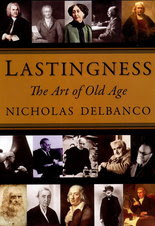 Since 1989 I've been without a television and I have not watched an Academy Awards ceremony. I do not feel culturally deprived [as I sometimes do when listening to people I respect enthusing about Downton Abbey]. But I have just read Ronnie Barrett's assessment of the pervasive ageism displayed Sunday at this year's awards. Click Times Goes By in the sidebar here.
Since 1989 I've been without a television and I have not watched an Academy Awards ceremony. I do not feel culturally deprived [as I sometimes do when listening to people I respect enthusing about Downton Abbey]. But I have just read Ronnie Barrett's assessment of the pervasive ageism displayed Sunday at this year's awards. Click Times Goes By in the sidebar here. In general we know that movies are made for the young male audience between 12 and 22 -- that is a demographic that wants nothing to do with anyone of their parents; generation, let alone their grandparents' generation. Yet, many Oscar winners this year, including the indomitable Christopher Plumber were well into the senior years. And the joked, remarks, asides and implications throughout, which Ronnie points out, were ageist.
A certain part of the population doesn't want to hear about any "ism", most especially feminism, racism or ageism, but all are rampant in our society. Cultures do not change rapidly but our culture changed enormously during the last century, so rapidly that the populace contains plenty of laggards who still have strong biases but now know that admitting them is safe only in like minded situations. Among these "isms" ageism is the latest and it's going to be around for quite a while as the population tilts ever more toward those of us over 65.
Many people don't see it because they don't feel it. Most of my associations are with people over 50. THEY are close enough to where they're going that they can't afford to be ageist. But many haven't felt it's bite ... yet. They will. Mos don't want to listen for it's insidiousness, as in the jokes at the Academy Awards, maybe they still harbor the ageism of earlier years. It's time to smell the smoke. If you don't speak up and protest when you get that burnt scene drifting your way, it will be too late to put out the fire -- which is headed our way with cuts in Medicare and pensions and so on.



 alt=""id="BLOGGER_PHOTO_ID_5713586627555492706" />
alt=""id="BLOGGER_PHOTO_ID_5713586627555492706" />




















